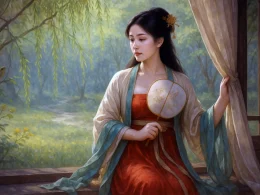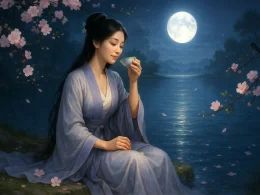Forget? Never forget!
That jade-tree lord and moon-bright maid we met.
How many times did our hearts break?
Rise from the bed? But to the bed I flee.
Once back in bed, thoughts drift to homeland far—
The boreal wind stretches dreams endlessly.
Original Poem
「长相思 · 要相忘」
吕本中
要相忘。不相忘。
玉树郎君月艳娘。几回曾断肠。
欲下床。却上床。
上得床来思旧乡。北风吹梦长。
Interpretation
This Zhǎng Xiàng Sī (Everlasting Longing) lyric was composed during the Song Dynasty. The tune title, often used to express parting sorrow and lovers' yearning, perfectly suits Lü Benzhong's life experience of constant travel—whether dwelling in foreign lands or lingering by rivers and lakes, he knew well the pain of separation from loved ones. This piece conveys his melancholic nostalgia through the mutual longing between a wandering man and his pining lady, embodying the sentiment of "wanting to forget yet being unable to." Composed perhaps while enduring northern winds during transitions between official posts and retirement, the lyric reveals his lingering attachment to past affections through this compact song form.
First Stanza: "要相忘。不相忘。玉树郎君月艳娘。几回曾断肠。"
Yào xiāngwàng. Bù xiāngwàng. Yùshù lángjūn yuè yàn niáng. Jǐ huí céng duàncháng.
"Let us forget." Yet we can't forget:
You, the jade-tree noble lord,
I, the moon-bright radiant maid—
How many times has longing torn our hearts apart?
The opening juxtaposes antithetical refrains—"let us forget" versus "can't forget"—instantly establishing emotional tension. The parallel metaphors "jade-tree noble lord" and "moon-bright radiant maid" mirror each other in natural splendor, evoking their past harmony. The hyperbole in "torn our hearts apart" crystallizes love's agony with visceral intensity.
Second Stanza: "欲下床。却上床。上得床来思旧乡。北风吹梦长。"
Yù xià chuáng. Què shàng chuáng. Shàng dé chuáng lái sī jiùxiāng. Běifēng chuī mèng cháng.
"I'll leave this bed." Yet back I lie,
And lying here, dream of old homes.
The north wind blows my dreams
Into endless lengthening sighs.
Here, abstract longing materializes through bodily motions—rising and returning to bed—capturing restless torment. The mirrored actions create rhythmic undulation, while "dream of old homes" merges romantic and geographical nostalgia. The concluding image of the north wind both extends dreams physically and stretches sorrow temporally, blending meteorological and psychological realms.
Holistic Appreciation
This masterpiece employs minimalist brushwork and intricate refrains to portray inextinguishable love. The first stanza establishes mutual yearning through direct address, while the second internalizes emotion through repetitive actions. Within its compact form, the lyric distills obsession's persistence, love's lingering sweetness, and memory's relentless grip. Resembling an oral folk ballad in its cadence yet bearing literati refinement in its layered emotions, the work prioritizes authentic feeling over ornate diction. Lü Benzhong's plainspoken language renders the sentiment palpably raw and enduringly resonant.
Artistic Merits
- Symmetrical Architecture: The stanzaic mirroring of three-character refrains ("要相忘"/"欲下床") creates incantatory rhythm, while parallel metaphors ("jade-tree"/"moon-bright") establish structural harmony.
- Sensory Interweaving: Tactile bed movements, visual natural imagery, and the auditory north wind construct a synesthetic experience of longing.
- Emotional Gradient: Progressing from conscious resistance ("let us forget") to subconscious surrender ("dream of old homes"), the lyric traces yearning's inevitable triumph.
- Temporal Expansion: The concluding wind metaphor stretches the present moment into infinite duration, spatializing time itself.
Insights
The lyric reveals how true affection persists despite separation, becoming not merely emotion but a life-sustaining force connecting memory, nostalgia, and existential warmth. Even amidst isolation and chilling winds, such bonds extend through dreams and heartspace—like the "north wind blowing dreams longer." It reminds us to cherish present togetherness, for once parted, remembrance becomes both sweetness and scar, equally precious and ineradicable.
About the Poet

Lü Benzhong (吕本中 1084 - 1145), a native of Shouxian in Anhui, was a renowned poet and Neo-Confucian scholar of the Southern Song Dynasty. As a key theorist of the Jiangxi Poetry School, he proposed the concept of "living method" (huofa), advocating for natural variation within established poetic rules. With over 1,270 surviving poems, his Genealogy of the Jiangxi Poetry School (Jiangxi Shishe Zongpai Tu) established Huang Tingjian as the school's patriarch, profoundly influencing Song poetic theory and serving as a bridge between the Jiangxi School and the Four Masters of the Mid-Song Revival.












